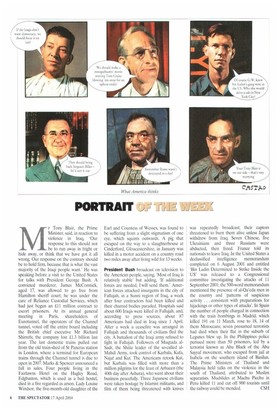M r Tony Blair, the Prime Minister, said, in reaction to
violence in Iraq, `Our response to this should not be to run away in fright or hide away, or think that we have got it all wrong. Our response on the contrary should be to hold firm, because that is what the vast majority of the Iraqi people want.' He was speaking before a visit to the United States for talks with President George Bush. A convicted murderer, James McCormick, aged 17, was allowed to go free from Hamilton sheriff court; he was under the care of Reliance Custodial Services, which had just begun an £11 million contract to escort prisoners. At its annual general meeting in Pads, shareholders of Eurotunnel, the operators of the Channel tunnel, voted off the entire board including the British chief executive Mr Richard Shirrefs; the company lost £1.3 billion last year. The last domestic trains pulled out from the old train-shed of St Pancras station in London, where a terminal for European trains through the Channel tunnel is due to open in 2007. Marks & Spencer announced a fall in sales. Four people living in the Fairlawns Hotel on the Hagley Road, Edgbaston, which is used as a bail hostel, died in a fire regarded as arson. Lady Louise Windsor, the five-month-old daughter of the
Earl and Countess of Wessex, was found to be suffering from a slight stigmatism of one eye, which squints outwards. A pig that escaped on the way to a slaughterhouse at Cinderford, Gloucestershire, in January was killed in a motor accident on a country road two miles away after living wild for 13 weeks.
President Bush broadcast on television to the American people, saying, `Most of Iraq is relatively stable' but adding, If additional forces are needed, I will send them.' American forces attacked insurgents in the city of Fallujah, in a Sunni region of Iraq, a week after four contractors had been killed and their charred bodies paraded. Hospitals said about 600 Iraqis were killed in Fallujah, and, according to press sources, about 87 Americans had died in Iraq since 1 April. After a week a ceasefire was arranged in Fallujah and thousands of civilians fled the city. A battalion of the Iraqi army refused to fight in Fallujah. Followers of Muqtada alSadr, the Shiite leader of the so-called alMahdi Army, took control of Karbala, Kufa, Najaf and Kut. The Americans retook Kut, but Karbala was filled with more than a million pilgrims for the feast of Arbaeen (the 40th day after Ashura), who went about their business peacefully. Three Japanese civilians were taken hostage by Islamist militants, and film of them being threatened with knives
was repeatedly broadcast; their captors threatened to burn them alive unless Japan withdrew from Iraq. Seven Chinese, five Ukrainians and three Russians were abducted, then freed. France told its nationals to leave Iraq. In the United States a declassified intelligence memorandum completed on 6 August 2001 and entitled 'Bin Ladin Determined to Strike Inside the US' was released to a Congressional committee investigating the attacks of 11 September 2001; the 500-word memorandum mentioned the presence of al-Qa'eda men in the country and 'patterns of suspicious activity . . . consistent with preparations for hijackings or other types of attacks'. In Spain the number of people charged in connection with the train bombings in Madrid, which killed 191 on 11 March, rose to 18, 14 of them Moroccans; seven presumed terrorists had died when their flat in the suburb of Leganes blew up. In the Philippines police pursued more than 50 prisoners, led by a terrorist known as Abu Black of the Abu Sayyaf movement, who escaped from jail at Isabela on the southern island of Basilan. The Prime Ministers of Thailand and Malaysia held talks on the violence in the south of Thailand, attributed to Muslim separatists. Mudslides at Machu Picchu in Peru killed 11 and cut oft 900 tourists until the railway could be mended. CSH


































































 Previous page
Previous page